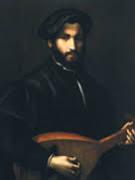Planning worship?
Check out our sister site, ZeteoSearch.org,
for 20+ additional resources related to your search.
- |
User Links
Person Results
L. C. Everett
1818 - 1867 Composer of "FATHER LEAD US" in Kind Words Leonard C. Everett's largest and most popular collection was The Wesleyan Hymn and Tune Book (1859), published by the Methodist Episcopal Church South. The denominational dedication page in that collection says it was "prepared by Mr. L.C. Everett, of Virginia, a gentleman well-known through the South and Southwest, as an author and teacher of sacred vocal music." In his own introductory remarks, Everett's instincts as an educator are clear. He advised churches to offer a weekly congregational singing class "for the purpose of meeting together frequently, say one evening each week, to practice the tunes under the direction of a suitably qualified chorister or leader, and ... that the entire congregation be invited to attend the rehearsals of the class and join in learning the tunes." For Everett, musical worship was not just the duty of a choir, it was the duty of everyone.
Leonard’s brothers were Asa Brooks Everett (1828-1875), N.E. Everett, & Benjamin Holden Everett. Leonard and Asa developed a successful music education system called "The Everett System," and together with R.M. McIntosh they formed the L.C. Everett Company, which employed approximately fifty music teachers throughout the American south and middle Atlantic.
—Chris Fenner
see also J.H. Hall, Biography of Gospel Song and Hymn Writers (New York: Fleming H. Revell, 1914), pp. 96-100.
L. C. Everett
W. S. Hoyte
1844 - 1917 Composer of "ST. MARGARET" in The Westminster Abbey Hymn-Book Born: September 22, 1844, Sidmouth, England.
Died: July 2, 1917.
Buried: Sidmouth, England.
Hoyte studied under John Goss and George Cooper. He played the organ at various locations, finally at All Saints, Margaret Street, London (1868-1907). He was also a professor of organ at the Royal College of Music (1888), and at the Royal Academy of Music (1893), and professor of the pianoforte at the Guildhall School. He was a member of the Philharmonic Society, and received his DMus degree from the Archbishop of Canterbury in 1904.
--www.hymntime.com/tch
W. S. Hoyte
John Dowland

1563 - 1626 Person Name: J. Dowland Composer of "[Lead us, heav'nly Father, lead us]" in Select Songs for the Singing Service John Dowland, (born 1562/63, Westminster, London, England—died January 21, 1626, London), English composer, virtuoso lutenist, and skilled singer, one of the most famous musicians of his time.
Nothing is known of Dowland’s childhood, but in 1580 he went to Paris as a “servant” to Sir Henry Cobham, the ambassador to the French court. In 1588 he received a bachelor of music degree from the University of Oxford. His conversion to Roman Catholicism, he believed, caused his rejection for a post as a court lutenist in 1594, and after that disappointment he left England to travel on the Continent. He visited the duke of Brunswick at Wolfenbüttel and the landgrave of Hesse at Kassel and was received with esteem at both courts. His travels also took him to Nürnberg, Genoa, Florence, and Venice, and by 1597 he had returned to England.
In 1598 Dowland became lutenist to Christian IV of Denmark, but he was dismissed for unsatisfactory conduct in 1606. Between 1609 and 1612 he entered the service of Theophilus, Lord Howard de Walden, and in 1612 he was appointed one of the “musicians for the lutes” to James I.
Although a respecter of tradition, Dowland worked during a time of musical transition and absorbed many of the new ideas he had encountered on the Continent. His 88 lute songs (printed 1597–1612) particularly reflect those influences. The early songs are presented with an alternative version for four voices. Possessing enchanting melodies, they show simple strophic settings, often in dance forms, with an almost complete absence of chromaticism. Later, in such through-composed songs as "In Darkness Let Me Dwell" (1610), "From Silent Night" (1612), and "Lasso vita mia" (1612), he introduced the Italian declamatory style, chromaticism, and dissonance; no alternative four-voice versions are given.
Dowland composed about 90 works for solo lute; many are dance forms, often with highly elaborate divisions to the repeats. His famous Lachrimae, or Seaven Teares Figured in Seaven Passionate Pavans (1604), became one of the most widely known compositions of the time. In his chromatic fantasies, the finest of which are "Forlorne Hope Fancye" and "Farewell," he developed this form to a height of intensity unequaled by any other writer for the Renaissance lute. His compositions also include several psalm harmonizations and sacred songs printed in contemporary music books.
--www.britannica.com/
John Dowland
Henry Farmer
1819 - 1891 Person Name: H. Farmer Composer of "FARMER" in In Excelsis for School and Chapel
Henry Farmer
Peter Edwards
1854 - 1934 Person Name: Parch Peter Edwards, Mus. Bac. (Pedr Alaw.) Composer of "DAKOTA" in Cân a Mawl Also: Pedr Alaw
From Welsh Biography Online, from The National Library of Wales.
Peter Edwards
R. Morris Lewis
1849 - 1918 Person Name: R. M. L. Translator of "Nefol Dad, tros fôr tymhestlog (Lead us, Heavenly Father, lead us)" in Mawl a chân = praise and song LEWIS, RICHARD MORRIS (1847-1918), scholar and littérateur; b. 1847 at Forest Arms, Brechfa, Carms., son of John and Leisa Lewis. He became principal clerk in H.M. Inland Revenue offices, Swansea. Translations by him appear in Welsh hymnaries; he also made metrical renderings in Welsh of passages from Homer's Iliad. Perhaps his most important contribution is his translation of Gray's Elegy. He d. 20 Sept. 1918, and was buried in Brechfa churchyard. Some of his MSS. are in the N.L.W. (N.L.W. MSS. 2249-50).
Bibliography:
T. Gwynn Jones (ed.), Homer Cyfieithiadau gan R. Morris Lewis, Wrexham, 1928 (Wrexham, 1928);
Cymru (O.M.E.), May 1926, 143;
Yr Efrydydd, Bangor, Aug. 1933.
Author:
Rev. Professor John Oliver Stephens, M.A., B.D., (1880-1957), Carmarthen
http://wbo.llgc.org.uk/en/s-LEWI-MOR-1847.html
R. Morris Lewis


 My Starred Hymns
My Starred Hymns

